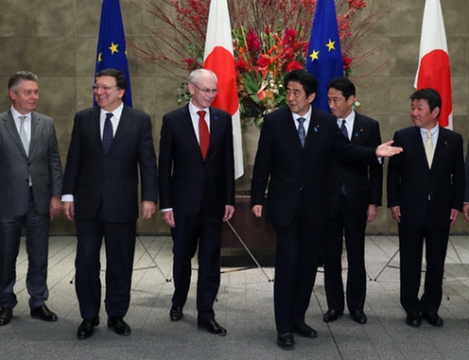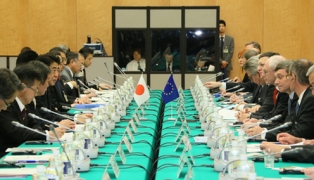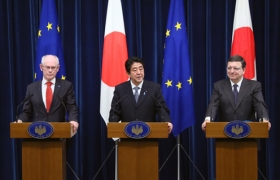Europe
The 21st Japan-EU Summit Meeting (Overview)
November 19, 2013
 (Photo: Cabinet Public Relations Office)
(Photo: Cabinet Public Relations Office)


On Tuesday, November 19, from 18:00 for approximately 2 hours and 30 minutes, Mr. Shinzo Abe, Prime Minister of Japan, held the 21st Japan-EU Summit as well as a press conference with H.E. Mr. Herman Van Rompuy, President of the European Council, and H.E. Mr. José Manuel Barroso, President of the European Commission. Mr. Fumio Kishida, Minister for Foreign Affairs, Mr. Shigemitsu Motegi, Minister for Economy, Trade and Industry and Mr. Karel De Gucht, European Commissioner for Trade, also participated in the Summit. As an outcome, both leaders issued a joint press statement.(PDF)
Main outcomes
1.Enhancing economic relations: Both leaders agreed to pursue a comprehensive and high level Economic Partnership Agreement (EPA) and reaffirmed their strong commitment to its early conclusion.
2.Expanding security cooperation: Prime Minister Abe gained understanding and support of the EU on the increasingly tense security situation in East Asia as well as Japan’s proactive contribution to peace based on the principle of international cooperation. Both leaders agreed to seek further collaboration on the anti-piracy efforts off the coast of Somalia, Cyber areas and others.
3.Promotion of global interest: Both leaders confirmed to collaborate on the common global agendas, such as the peaceful use of Outer Space, effective development cooperation, and the mainstreaming of disaster risk reduction. They also agreed to pursue early conclusion of a Strategic Partnership Agreement (SPA) which will serve as a foundation for further strengthening Japan-EU relations in a wide range of fields.
4.Regional issues and global agendas: Both leaders discussed regional issues including East Asia, Middle East and Africa and global issues such as climate change. They fostered common understanding and agreed on further collaboration.
Overview of the meeting
1.Opening remarks
Prime Minister Abe, welcoming both presidents, stated that Japan placed huge importance on the EU as a global partner sharing fundamental values and playing an important role in the international community through its deepening and enlargement. He also expressed his determination to play a leading role toward peace and prosperity in the world together with the EU. In response, the EU leaders expressed heartfelt gratitude to Japan’s hospitality and stressed the importance of strengthening Japan-EU strategic partnership in the midst of rapidly changing global situation.
2.Prospects of Japan-EU cooperation
3.Regional issues and global agendas
4.Haiku by both leaders
At the joint press conference, President Van Rompuy read his original Haiku “People far away, But sun and stars on our flags, Belong together.” Prime Minister Abe in response introduced his haiku when he made a toast of the working dinner: “Star-filled sky, Looking up the stars at night, Dear friends join.”

Main outcomes
1.Enhancing economic relations: Both leaders agreed to pursue a comprehensive and high level Economic Partnership Agreement (EPA) and reaffirmed their strong commitment to its early conclusion.
2.Expanding security cooperation: Prime Minister Abe gained understanding and support of the EU on the increasingly tense security situation in East Asia as well as Japan’s proactive contribution to peace based on the principle of international cooperation. Both leaders agreed to seek further collaboration on the anti-piracy efforts off the coast of Somalia, Cyber areas and others.
3.Promotion of global interest: Both leaders confirmed to collaborate on the common global agendas, such as the peaceful use of Outer Space, effective development cooperation, and the mainstreaming of disaster risk reduction. They also agreed to pursue early conclusion of a Strategic Partnership Agreement (SPA) which will serve as a foundation for further strengthening Japan-EU relations in a wide range of fields.
4.Regional issues and global agendas: Both leaders discussed regional issues including East Asia, Middle East and Africa and global issues such as climate change. They fostered common understanding and agreed on further collaboration.
Overview of the meeting
1.Opening remarks
Prime Minister Abe, welcoming both presidents, stated that Japan placed huge importance on the EU as a global partner sharing fundamental values and playing an important role in the international community through its deepening and enlargement. He also expressed his determination to play a leading role toward peace and prosperity in the world together with the EU. In response, the EU leaders expressed heartfelt gratitude to Japan’s hospitality and stressed the importance of strengthening Japan-EU strategic partnership in the midst of rapidly changing global situation.
2.Prospects of Japan-EU cooperation
(1)Enhancing economic relations
Both leaders agreed to pursue a comprehensive and high level Economic Partnership Agreement (EPA) and reaffirmed the strong commitment from both sides towards the early conclusion of the agreement. In addition, both leaders concurred to promote cooperation in the area of research and innovation including the research on LNG market.
On top of these issues, Prime Minister Abe explained Japan’s concrete measures for economic revitalization as well as fiscal consolidation, including efforts to promote active participation by women. Furthermore, Prime Minister Abe requested for easing the EU’s import regulation against Japanese products. In response, the EU leaders explained its efforts to overcome the European sovereign debt crisis and made a positive assessment of Japan’s economic and fiscal policies by referring to significant outcomes of Abenomics for the last twelve months.
(2)Expanding security cooperation
Prime Minister Abe briefed on Japan’s security policy based the principle of “Proactive Contribution to Peace” and expressed its determination towards contributing even more actively to peace and stability in the region and the world. In response, the EU leaders clearly welcomed and strongly supported Japan’s proactive contribution to its peace by appreciating Japan’s intention to play a greater role.
As a part of the counter piracy efforts off the coast of Somalia, both leaders agreed to enhance further cooperation on capacity building of the maritime security of neighboring countries including through utilization of the Djibouti Regional Training Center. Within this context, they agreed to strengthen communication and information exchange between deployed personnel on the ground. Furthermore, they decided to bring together their experts to explore the possibility of launching a regular dialogue on cyber security. The EU leaders expressed their expectation of enhanced collaboration between Japan and CSDP missions.
Both leaders reconfirmed their commitment to responsible export controls of arms and dual-use goods and technologies by paying consideration to preserving peace and stability especially in areas of tension.
(3)Promoting global interest
Both leaders agreed on the launch of a Japan-EU Space Policy Dialogue. In addition, given that both Japan and the EU are main donors in development area, both leaders concurred to strengthen effective collaboration between respective development agencies, to promote mainstreaming disaster risk reduction, and to closely cooperate towards the Third UN World Conference on Disaster Risk Reduction in Japan in 2015.
Both leaders reconfirmed that a Strategic Partnership Agreement (SPA) currently under negotiation should serve as a foundation for further strengthening the cooperative relations in a broad range of fields and early conclusion of the agreement is of vital importance as is the EPA.
Both leaders agreed to pursue a comprehensive and high level Economic Partnership Agreement (EPA) and reaffirmed the strong commitment from both sides towards the early conclusion of the agreement. In addition, both leaders concurred to promote cooperation in the area of research and innovation including the research on LNG market.
On top of these issues, Prime Minister Abe explained Japan’s concrete measures for economic revitalization as well as fiscal consolidation, including efforts to promote active participation by women. Furthermore, Prime Minister Abe requested for easing the EU’s import regulation against Japanese products. In response, the EU leaders explained its efforts to overcome the European sovereign debt crisis and made a positive assessment of Japan’s economic and fiscal policies by referring to significant outcomes of Abenomics for the last twelve months.
(2)Expanding security cooperation
Prime Minister Abe briefed on Japan’s security policy based the principle of “Proactive Contribution to Peace” and expressed its determination towards contributing even more actively to peace and stability in the region and the world. In response, the EU leaders clearly welcomed and strongly supported Japan’s proactive contribution to its peace by appreciating Japan’s intention to play a greater role.
As a part of the counter piracy efforts off the coast of Somalia, both leaders agreed to enhance further cooperation on capacity building of the maritime security of neighboring countries including through utilization of the Djibouti Regional Training Center. Within this context, they agreed to strengthen communication and information exchange between deployed personnel on the ground. Furthermore, they decided to bring together their experts to explore the possibility of launching a regular dialogue on cyber security. The EU leaders expressed their expectation of enhanced collaboration between Japan and CSDP missions.
Both leaders reconfirmed their commitment to responsible export controls of arms and dual-use goods and technologies by paying consideration to preserving peace and stability especially in areas of tension.
(3)Promoting global interest
Both leaders agreed on the launch of a Japan-EU Space Policy Dialogue. In addition, given that both Japan and the EU are main donors in development area, both leaders concurred to strengthen effective collaboration between respective development agencies, to promote mainstreaming disaster risk reduction, and to closely cooperate towards the Third UN World Conference on Disaster Risk Reduction in Japan in 2015.
Both leaders reconfirmed that a Strategic Partnership Agreement (SPA) currently under negotiation should serve as a foundation for further strengthening the cooperative relations in a broad range of fields and early conclusion of the agreement is of vital importance as is the EPA.
3.Regional issues and global agendas
(1)East Asia
Prime Minister Abe said that Japan-China relation is one of the most important bilateral relations, and despite some specific issues, Japan would like to manage the relations in a proactive manner. He also stated that Japan’s door is always open for dialogue. The EU leaders welcomed Japan’s approach towards dialogue with China and said that they would encourage China to engage with constructive dialogue with Japan during their following visit to Beijing.
With regards to North Korea’s nuclear issue, both leaders concurred that they would never accept North Korea with nuclear weapons and North Korea should implement a series of the relevant UN Security Council resolutions in a sincere and steadfast manner. Both leaders reiterated the further collaboration on the abduction issue.
(2)Middle East and North Africa
Regarding Iran, Prime Minister Abe stated that Japan would like to play a role built upon his meeting with President Rouhani at the occasion of the UN General Assembly and Foreign Minister Kishida’s visit to Iran so that Iran can engage with regional and international challenges in a positive manner and promote confidence building with international community. In response, the EU leaders explained the efforts of the EU 3+3 and expressed their intention to continue close cooperation with Japan on this issue.
Regarding Syria, both leaders welcomed the recent adoption of the UN Security Council resolution on abolition of chemical weapon and confirmed further cooperation.
(3)Global challenges
Regarding the climate change issue, Prime Minister Abe explained Japan’s newly announced the “Proactive Diplomatic Strategy for Countering Global Warming.” In response, the EU leaders expressed its understanding of the different energy situation facing Japan and stressed the importance of close cooperation in the area of global warming.
Prime Minister Abe said that Japan-China relation is one of the most important bilateral relations, and despite some specific issues, Japan would like to manage the relations in a proactive manner. He also stated that Japan’s door is always open for dialogue. The EU leaders welcomed Japan’s approach towards dialogue with China and said that they would encourage China to engage with constructive dialogue with Japan during their following visit to Beijing.
With regards to North Korea’s nuclear issue, both leaders concurred that they would never accept North Korea with nuclear weapons and North Korea should implement a series of the relevant UN Security Council resolutions in a sincere and steadfast manner. Both leaders reiterated the further collaboration on the abduction issue.
(2)Middle East and North Africa
Regarding Iran, Prime Minister Abe stated that Japan would like to play a role built upon his meeting with President Rouhani at the occasion of the UN General Assembly and Foreign Minister Kishida’s visit to Iran so that Iran can engage with regional and international challenges in a positive manner and promote confidence building with international community. In response, the EU leaders explained the efforts of the EU 3+3 and expressed their intention to continue close cooperation with Japan on this issue.
Regarding Syria, both leaders welcomed the recent adoption of the UN Security Council resolution on abolition of chemical weapon and confirmed further cooperation.
(3)Global challenges
Regarding the climate change issue, Prime Minister Abe explained Japan’s newly announced the “Proactive Diplomatic Strategy for Countering Global Warming.” In response, the EU leaders expressed its understanding of the different energy situation facing Japan and stressed the importance of close cooperation in the area of global warming.
4.Haiku by both leaders
At the joint press conference, President Van Rompuy read his original Haiku “People far away, But sun and stars on our flags, Belong together.” Prime Minister Abe in response introduced his haiku when he made a toast of the working dinner: “Star-filled sky, Looking up the stars at night, Dear friends join.”

